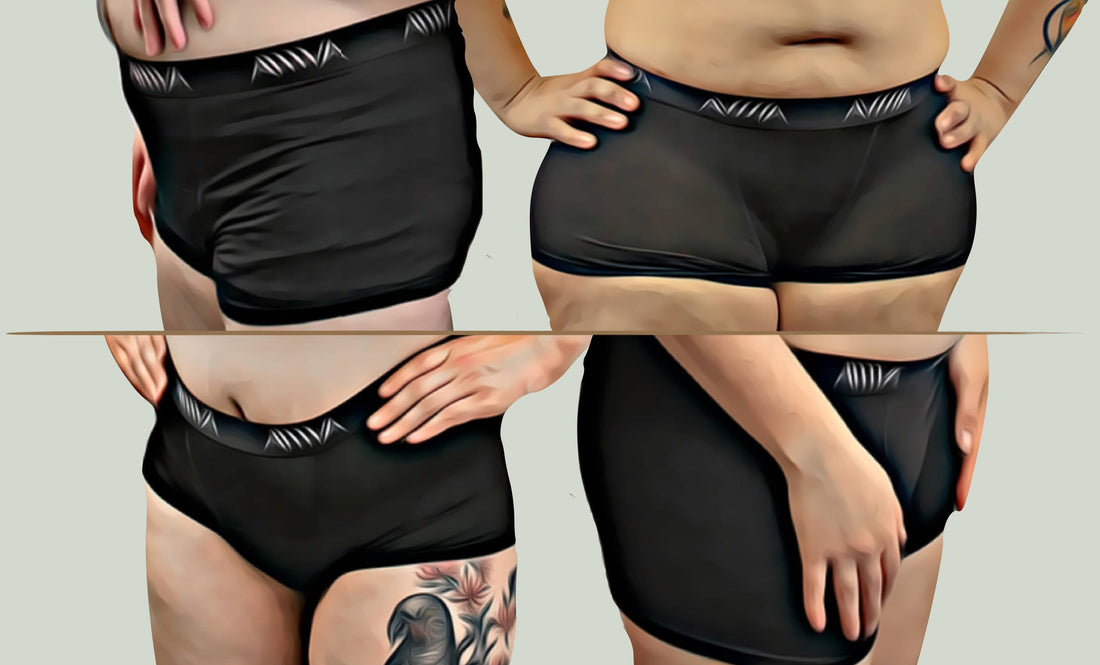
Four Period Stories
All of us who menstruate will have stories that define our experience: the first time finding blood in our underwear, the time we bled through our pants, the time our period came a week early and surprised us during a trip away, the time our period seemed to last for three months straight … whilst the stories themselves might differ, the experience of learning about our bodies and going on a journey to understand our menstrual cycles has universal similarities.
The following stories are diverse, and yet the themes are familiar – surprise and fear, embarrassment and shame, empowerment and acceptance.
Kayden Hunter (he/him/xe/xem) is trans-masculine non-binary. Having first dealt with heavy and irregular periods as a teenager, Kayden began using the combined pill to manage his periods. When xe began testosterone at 21, Kayden experienced “no periods for 5 years, then suddenly began bleeding irregularly, not as heavily but constantly for months.”
Whilst testosterone often does stop monthly bleeding, as Kayden experienced for the first 5 years of being on it, many trans men and trans-masculine people who use testosterone hormone therapy still experience a menstrual cycle in some way, whether this means irregular bleeding, spotting, or cramps, and there is currently a lack of research around trans people and menstruation.
Understandably, after not experiencing monthly bleeding for five years, Kayden was “quite upset for a while because of it returning.”
“It made things a lot more difficult, having to miss a few of my classes at University because of the pain which made it difficult to walk at points, while being at Uni it would often distract me and I had to leave a class due to being so upset because of it.
“I withdrew quite a bit from some of my social circles & haven’t done any dating, worried about what others would think about it & just because I couldn’t bear to be touched like this. Periods had always been one of the major sources of dysphoria for me, I lost quite a lot of hope when it returned.”
Despite experiencing dysphoria and struggling with his period returning, Kayden has now “come to learn to live with it”. Xe asserts that “period underwear made it even less of a worry”, allowing him to not think about menstruation for a few hours.
Kayden’s journey has made him “acutely aware … aware of the lack of sanitary bins in men’s bathrooms, forcing me into disability bathrooms, making me feel like I’m taking up space I didn’t really need.” Xe is now “trying to put pressure on my University for these facilities to be available in men’s bathrooms for people like me.”
Positively, Kayden now states that there is “no shame in being a man that bleeds, it takes strength to be that man when the world is so set on saying you don’t exist & refuses to make space for you. Make your own space, take care of yourself and others.”
Like Kayden, Heather McIvor’s (non-binary – they/them) period journey began with irregular and heavy periods, with Heather’s particularly heavy, leaving them anaemic “because I couldn’t keep any iron in my body, it was all being bled out.”
Whilst all period journeys are deeply personal, Heather’s is particularly so, filled with failures from medical professionals, illness, financial difficulties and pain.
“Each year the periods and pain got worse,” Heather explains. “In 2016 I started to become bed-bound on and off for months. Constantly bleeding through my clothes and bedding, my bills started to increase and I became paranoid of smelling and having stains on my clothes, even to this day I’m triggered by the smell or idea that I could be having my period.”
Heather experienced “years of gaslighting, abuse, neglect and invalidation from doctors, nurses, mental health staff, physiologists, loved ones and even the surgeon.”
Needing to miss work because of illness, and developing anxiety around toilet breaks when there weren’t enough people available to cover at work, affected Heather financially, as did the need to be constantly changing pads and tampons.
When seeking medical help, Heather explains, “My GP at the time diagnosed me as depressed, ignored all of my symptoms and focused on anti-depressants and anxiety medication. I went back nearly every 6 to 8 weeks but because of my age, looks and mental health history they were ignored.”
Heather’s story of being ignored by their doctor is not uncommon. Research in the UK found that it takes an average of seven and a half years for endometriosis to be diagnosed, and it was only in 2020 that best-practice guidelines for doctors were introduced in New Zealand.
Financially and emotionally drained, Heather explains, “I was spending hundreds to thousands of dollars on doctors appointments alone having to repeatedly talk about how my period was deliberating and I couldn’t socialise as most of my energy went to work and I felt I was losing my mind yet nothing was done.
“Financially drained, I felt like a burden to my partner for he was supporting me as I couldn’t work full time and on my friends as I couldn’t afford to go out.”
It wasn’t until a suicide attempt that Heather was referred to a gynaecologist and, after surgery, they received confirmation of an endometriosis diagnosis, a moment that Heather describes as “bittersweet.”
From their journey, Heather learnt “that you know your body better than anybody, more than your loved ones, more than doctors, more than anything … I am worthy of life, I am worthy of love, I am worthy of help and treatment.”
In a different way, Jay, who is a transgender female (she/her), gets a period “due to medications I’m on to affirm my gender identity”. Whilst menstruation in trans bodies is still not overly understood, Jay’s experience does not seem uncommon, with Trans Hub Australia stating that “upon starting feminising hormones, they experience a regular and varying hormonal cycle. Little research has been done on this phenomenon, but it can still exist and affect people’s lives.”
Jay explains, “A period for me means that I have a cycle like anyone with ovaries and I experience all the PMS symptoms and period pains. I use period underwear to be more comfortable while I’m on my period.”

Yessenia (Jess) Sandoval, a cisgender woman (she/her), got her first period at 13; having had limited education around periods, Jess explains that she kept it a secret for a few days, afraid that she was dying. It was when Jess was around 18 that her periods “changed and they became very heavy and painful”, and she received an endometriosis and polycystic ovaries diagnosis in her early 20s.
After a few years, Jess explains how she “developed hate towards my period, it was a reminder of the struggle I faced to get pregnant and carry a baby to full term, it became normal to have my period for weeks/months or to not have it for weeks/months. In Dec 2018 I got my period and it just never stopped.”
Like Heather, Jess was adversely affected financially due to the heaviness of her periods. Jess states “it got to the point I was going through a box of super tampons in a day, when I was at work I was wearing a super tampon, a heavy pad, with an additional underwear with another heavy pad and still bleeding through.”
Attending work became difficult for Jess, with her iron levels getting so low that she experienced fainting at work, and she began struggling mentally and physically.
“I am a single mum,” Jess explains, “and between everyday bills, extra doc appointments, time off work and period items I was struggling to afford sanitary products, and missed work.”
This experience led Jess to help to fight period poverty, having experienced first-hand the difficulties that not being able to afford period products can cause.
Despite having a hysterectomy, Jess continued to lightly bleed, and still needs to use period products two years after her surgery. Whilst she now only bleeds every now and again, Jess continues to experience “horrible ovulation pain (mittelschmerz) each month, as well as bladder issues and discharge due to 3 suspected ruptured cysts.
“So though my period days are over,” Jess states, “they are not really over, so period underwear is great for all of these things, if I was able to go back in time and tell myself to try and get some period underwear I would, and I would give myself a big hug and say ‘you got this’.”
Written by Shardae Grenfell, AWWA Guest Blogger.

